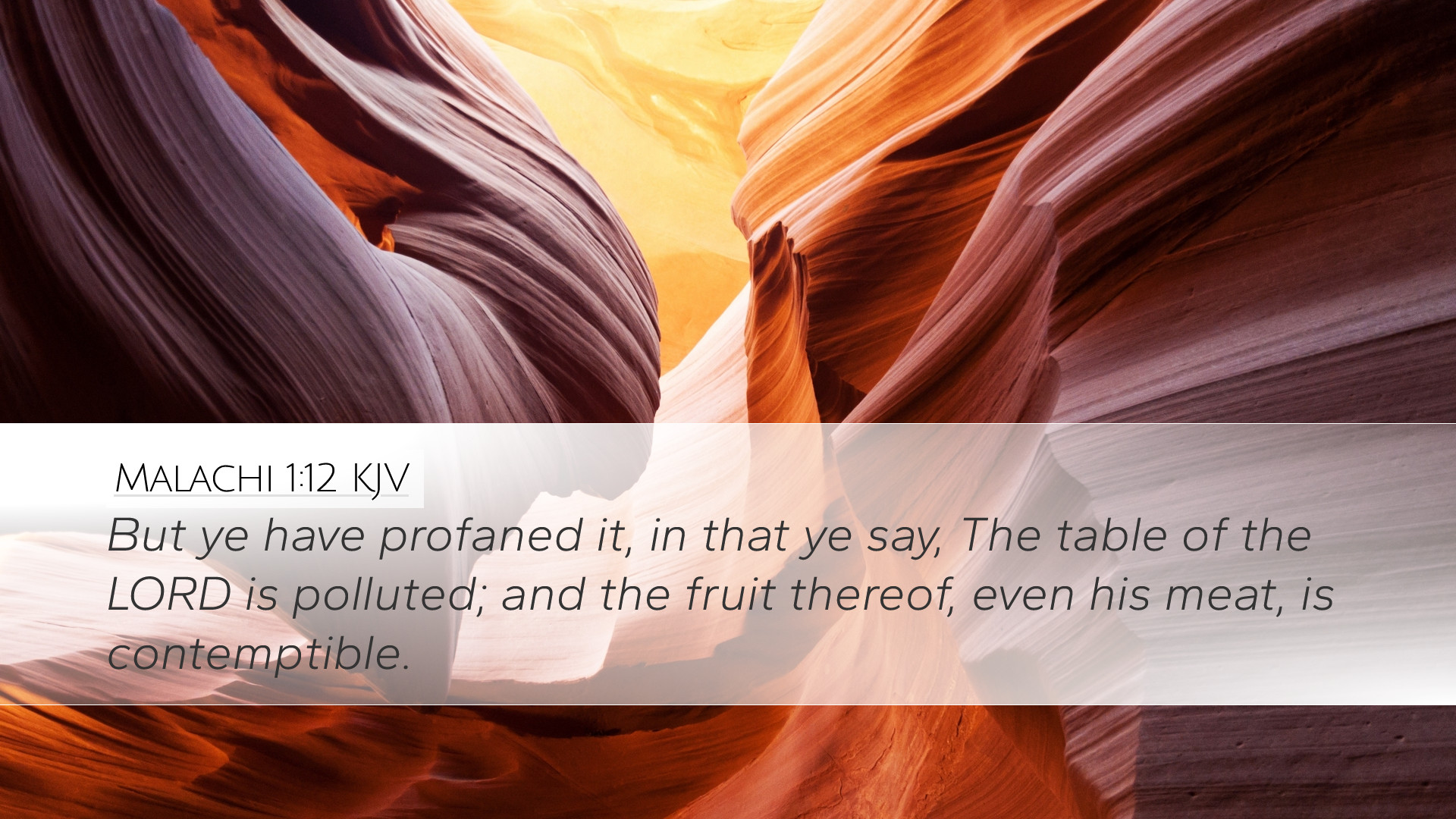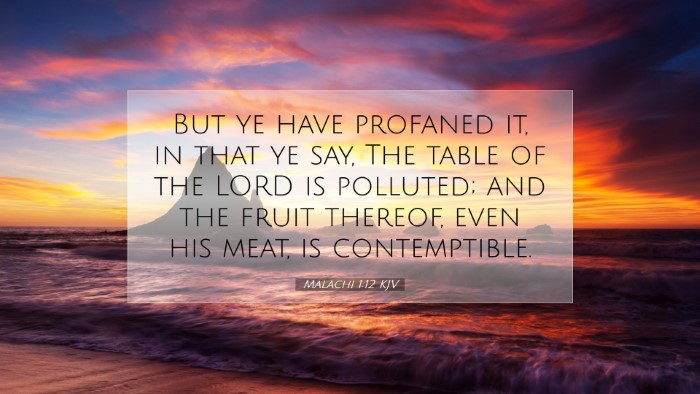Old Testament
Genesis Exodus Leviticus Numbers Deuteronomy Joshua Judges Ruth 1 Samuel 2 Samuel 1 Kings 2 Kings 1 Chronicles 2 Chronicles Ezra Nehemiah Esther Job Psalms Proverbs Ecclesiastes Song of Solomon Isaiah Jeremiah Lamentations Ezekiel Daniel Hosea Joel Amos Obadiah Jonah Micah Nahum Habakkuk Zephaniah Haggai Zechariah MalachiMalachi 1:12
Malachi 1:12 KJV
But ye have profaned it, in that ye say, The table of the LORD is polluted; and the fruit thereof, even his meat, is contemptible.
Malachi 1:12 Bible Commentary
Commentary on Malachi 1:12
Bible Verse: Malachi 1:12 - "But ye have profaned it, in that ye say, The table of the Lord is polluted; and the fruit thereof, even his meat, is contemptible."
Introduction
This profound verse from Malachi presents a serious indictment against the priests and the people of Israel for their careless attitude towards the sacrificial system prescribed by God. Understanding this verse requires delving into the historical context, the nature of the offerings, and the theological implications of profaning the table of the Lord.
Historical Context
The book of Malachi is the last of the Minor Prophets in the Old Testament, written during a time when the Israelites had returned from Babylonian exile but were struggling to restore their covenant relationship with God. The spiritual apathy and disobedience of the people are evident throughout the book, and Malachi’s role is to call them back to faithfulness.
Spiritual Decline
- Post-exilic conditions: The Jewish community was trying to rebuild their lives and the temple, yet their offerings were lackluster.
- Religious leadership failure: The priests were not only neglecting their duties but also leading the people astray by accepting substandard offerings.
Exegesis of Malachi 1:12
This verse demonstrates a clear accusation of sacrilege. The priests and presumably the laypeople are trivializing the sacrificial practices, which were central not only to worship but to the covenantal relationship with God.
Profaning the Table of the Lord
Malachi uses strong language to convey the gravity of their actions. The table of the Lord symbolizes the altar and the provisions associated with worship. By declaring it polluted, they are essentially devaluing something sacred.
- Matthew Henry: He emphasizes that “to regard God’s service as a burden and what is offered to Him with contempt gives the clearest indication of the state of one’s heart towards God.”
- Adam Clarke: He notes that the priests’ disdain for their duties led them to accept inferior offerings, which demonstrated a lack of reverence for God and His commands.
- Albert Barnes: He points out that their contempt for the offerings reflects a deeper contempt for God Himself, showing an alarming disregard for the holiness of their sacrificial system.
Theological Implications
This verse invites deeper reflection on several theological considerations, particularly concerning worship and the nature of offerings.
1. The Nature of Worship
Worship must stem from a heart that honors God. The Israelites were offering what they had but with a poor attitude, indicating that God seeks not just offerings but reverence.
- True worship: It must be undertaken with sincerity and respect. Worship that lacks heart is essentially meaningless (Henry).
2. The Value of Offerings
In the Old Testament context, sacrifices were a means of atonement and communion with God. To treat them lightly is to treat God lightly.
- Efficacy of offerings: Clarke argues that the effectiveness of an offering is not in its material elements but in the spirit in which it is presented.
- God's response: When worship becomes inadvertently insincere, it invites divine disapproval and impatience (Barnes).
Application for Today
This verse remains pertinent for contemporary worshippers and leaders. Issues of reverence, commitment, and genuine spirituality are just as vital today.
- Self-examination: Leaders and congregants alike must continually assess their attitude towards God and worship. Are we bringing our best to God?
- Reverence in worship: Attitudes towards offerings, including time, talents, and treasures, should reflect the honor we attribute to God.
- The essence of worship: It should not be reduced to mere rituals; rather, it should flow from a relationship marked by love, respect, and authenticity.
Conclusion
Malachi 1:12 serves as a potent reminder that God deserves the best we can offer, not just in terms of material provisions but primarily in our attitudes and commitment toward Him and His service. As we reflect on our practices in worship, may we strive to avoid the pitfalls of indifference and contempt, instead offering ourselves fully in devotion to our Almighty God.


